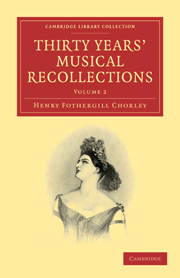Book contents
- Frontmatter
- Contents
- THE YEAR 1847
- THE YEAR 1848 (Her Majesty's Theatre.)
- THE YEAR 1848 (Royal Italian Opera.)
- THE YEAR 1849 (Her Majesty's Theatre.)
- THE YEAR 1849 (Royal Italian Opera.)
- THE YEAR 1850 (Her Majesty's Theatre.)
- THE YEAR 1850 (Royal Italian Opera.)
- THE YEAR 1851 (Her Majesty's Theatre.)
- THE YEAR 1851 (Royal Italian Opera.)
- THE YEAR 1852 (Her Majesty's Theatre.)
- THE YEAR 1852 (Royal Italian Opera.)
- THE YEAR 1853 (Royal Italian Opera.)
- THE YEAR 1854 (Royal Italian Opera)
- THE YEAR 1855 (Royal Italian Opera.)
- THE YEAR 1856 (Her Majesty's Theatre.)
- THE YEAR 1856 (Royal Italian Opera.)
- THE YEAR 1857 (Royal Italian Opera.)
- THE YEAR 1857 (Her Majesty's Theatre.)
- THE YEAR 1858 (Her Majesty's Theatre.—Royal Italian Opera.—Drury Lane.)
- THE YEAR 1859 (Royal Italian Opera.—Drury Lane.)
- The Last Chapter
THE YEAR 1854 (Royal Italian Opera)
Published online by Cambridge University Press: 29 August 2010
- Frontmatter
- Contents
- THE YEAR 1847
- THE YEAR 1848 (Her Majesty's Theatre.)
- THE YEAR 1848 (Royal Italian Opera.)
- THE YEAR 1849 (Her Majesty's Theatre.)
- THE YEAR 1849 (Royal Italian Opera.)
- THE YEAR 1850 (Her Majesty's Theatre.)
- THE YEAR 1850 (Royal Italian Opera.)
- THE YEAR 1851 (Her Majesty's Theatre.)
- THE YEAR 1851 (Royal Italian Opera.)
- THE YEAR 1852 (Her Majesty's Theatre.)
- THE YEAR 1852 (Royal Italian Opera.)
- THE YEAR 1853 (Royal Italian Opera.)
- THE YEAR 1854 (Royal Italian Opera)
- THE YEAR 1855 (Royal Italian Opera.)
- THE YEAR 1856 (Her Majesty's Theatre.)
- THE YEAR 1856 (Royal Italian Opera.)
- THE YEAR 1857 (Royal Italian Opera.)
- THE YEAR 1857 (Her Majesty's Theatre.)
- THE YEAR 1858 (Her Majesty's Theatre.—Royal Italian Opera.—Drury Lane.)
- THE YEAR 1859 (Royal Italian Opera.—Drury Lane.)
- The Last Chapter
Summary
There was nothing this year at Covent Garden Theatre that called for remark, save the accession to the company of Signor Lablache;—the first of Madame Grisi's many farewell performances; an inroad made by Mademoiselle Cruvelli, the result of which in no respect bore out her popularity in the Haymarket;—the appearance of Mademoiselle Marai, a useful and pleasing second woman, whose voice, after a season or two, somehow dwindled away; and the production of Signor Rossini's delicious “Comte Ory.”—On the whole the season was a supine one:—and such stir as might be found in the opera-world, was among the Germans at Drury Lane.
The delicious “Comte Ory” has, with all the beauty of its music, never been a favourite anywhere. Even in the theatre for which it was written, the Grand Opera of Paris, where it still keeps its place—even when Madame Cinti-Damoreau was the heroine—giving to the music all the playfulness, finish, and sweetness which could possibly be given—the work was heard with but a tranquil pleasure.—Like the excellent “Le Philtre” of M. Auber (which, as I have elsewhere said, entirely outdoes “L'Elisir”—the Italian setting of the same fancy) it is too delicate for a large stage.—But like other of Signor Rossini's operas—may it not be said, all of them?—“Il Barbiére,” “La Gazza,” and “Otello,” excepted—the music suffers for the story; and the composer, by his want of selection or disdain, proved once again his own enemy.
- Type
- Chapter
- Information
- Thirty Years' Musical Recollections , pp. 210 - 216Publisher: Cambridge University PressPrint publication year: 2009First published in: 1862

